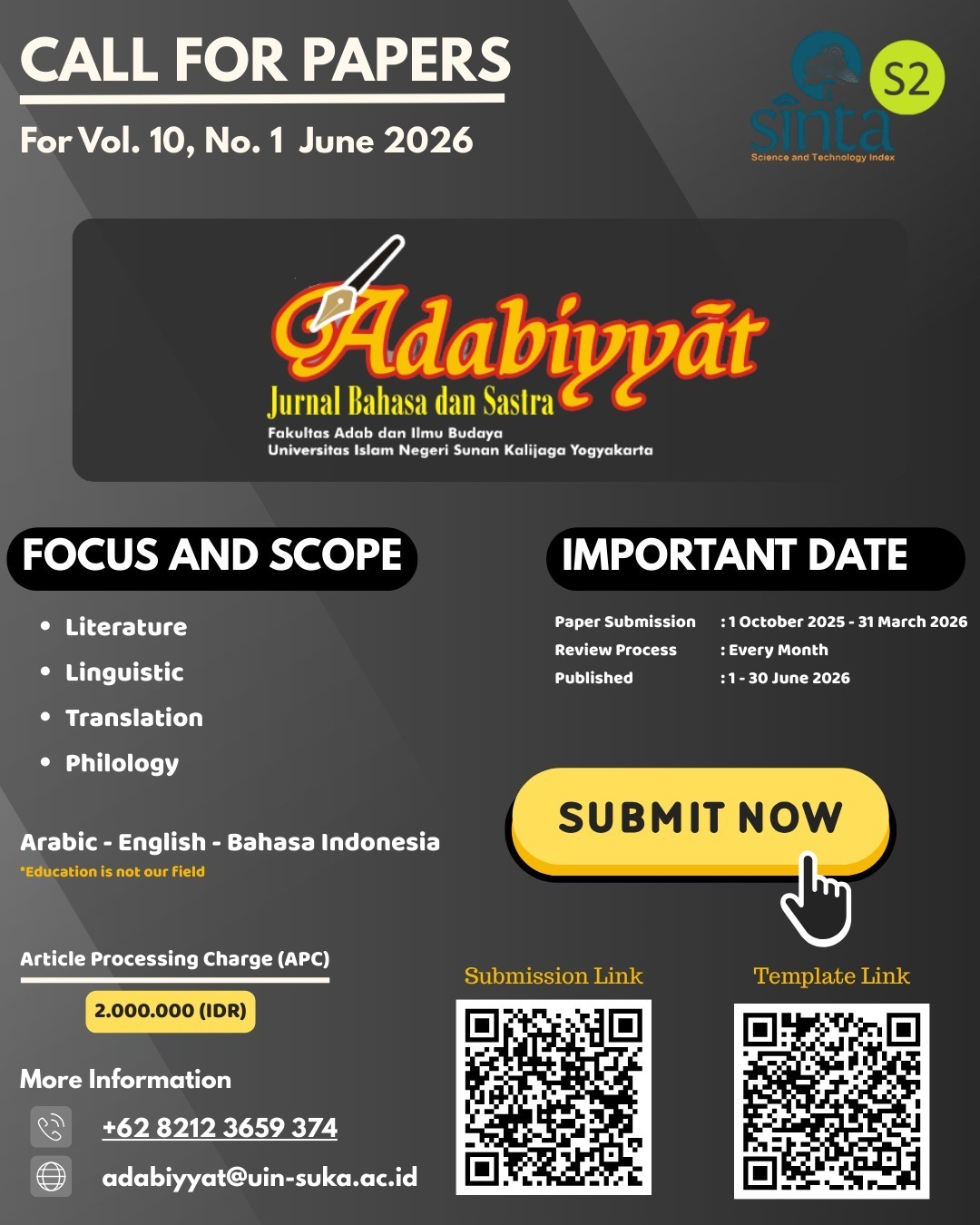WAJAH PURITANISME DALAM DRAMA MOURNING BECOMES ELECTRA KARYA EUGENE O’NEILL
DOI:
https://doi.org/10.14421/ajbs.2011.10106Abstract
It’s impossible to discuss American literature without mentioning Eugene O’Neill, including his renowned drama Mourning Becomes Electra (MBE). MBE is a drama that describes a Puritan family called the Mannons. The main characters in MBE live in a strict and severe Puritan society. Both the Mannons and Puritans establish a family and community on the same principles, the belief in covenant, a tenet that is taught by John Calvin. They also have the same dream about a new land, New Jerusalem for Puritans and Blessed Island for the Mannons. The article aims at disclosing the constricting Puritans society in New England and the cruelty of the central characters in MBE. In addition, the way in which Eugene O’Neill creates tragic characters at the end of the drama can be related to the decline of Puritanism. Goldmann’s sociology of literature is applied as an approach. The imaginary structure between an aesthetic and history—MBE and Puritan society—is discovered. The Mannons in MBE and Puritans in New England have similar attitudes. Both are cruel because they desire to be in power and control economic fields. The efforts to realize the dreams are challenged by other communities and it marks the beginning of puritanical decline in New England and the death of central character in MBE. The tragic visions of the Mannons and puritans guide them to death and fall.
Downloads
References
Black, Stephen A. 1999. Eugene O’Neill: Beyond Mourning and Tragedy. Haven and London: Yale University Press.
Brown, John Mason. 1931. “Becomes Electra, Eugene O’Neill’s Exciting Trilogy, Is Given an Excellent Production at The Guild.” In New York Post. October. Dalam http://www.eoneill.com/artifacts/reviews/mbe1_post.htm. Diakses tanggal 25 Maret 2011
Duvignaud, Jean. 1973. “The Theatre in Society: Society in Theatre,” in Sociology of Literature and Drama. Baltimore: Penguin Books.
Esslin, Martin (Ed). 1987. History of The World. New York: Larousse Kingfisher Chamber Inc.
Goldmann, Lucien. 1964. Hidden God. London: Routledge and Kegan Paul
Goldmann, Lucien. 1973. “Genetic Structuralism in the Sociology of Literature.” In Sociology of Literature and Drama. Baltimore: Penguin Books.
Capezza, Rick. 2002. “Revivalism and the Decline of American Christendom” In The American Christendom: New Christendom Journal. Dalam http://www. newchristendom.com/lssue%202/awakening.htm. Diakses tanggal 4 Januari 2003.
Hall, Stuart. 1980. “Cultural Studies: Two Paradigms.” In Media Culture and Society. January. http://xroads.virginia.edu/~DRBR/hall.html Halfmann, Ulrich (Ed.). 1987. Diakses tanggal 20 Maret 2003.
Huber, Herbert. 2002. “Where Love is No Sin: The Blessed Isles in Eugene O’Neill’s Mourning Becomes Electra. http://www.lesekost.de/amlit/HHK0301.htm#fn1return. Diakses tanggal 25 Maret 2011.
Kernodle, George R. 1967. Invitation to Theather. New York: Harcourt, Brace and World Inc.
Manheim, Michael. (Ed.). 1998. “O’Neill Criticism,” in the Cambridge Companion to Eugene O’Neill. Cambridge: Cambridge University Press.
Murray, Iain. 1976. “Spiritual Characteristics of the First Christian Society in America,” Banner of Truth Magazine. October. http//www.puritansermons.com/banner/murray3.htm. Diakses tanggal 20 Maret 2003
Miller, Perry 1956. Errand in the Wilderness. New York: Harper and Row.
Olmstead, Clifton E. 1960. History of Religion in the United States. New York: Prentice Hall.
O’Neill, Eugene. Mourning Becomes Electra (A Trilogy). e-book. First
Posted, January 2004. Dalam http://gutenberg.net.au/ ebooks04/0400141h.. Diakses tanggal 5 Oktober 2010.
Reinert, Otto. (Ed). 1964. Drama. Boston: Little, Brown and Company.
Serafin, Steven. R (General Ed.) and Alfren Bendixen (Ass. Ed.). 1999. Encyclopedia of American Literature. New York: Continuum Publisher.
Warfel, Harry R., Ralph H. Gabriel., Stanley T. Williams (Ed.). 1963. The American Mind. New York: American Book Company.
Win, Mellissa Leigh. 2002. “The Concept of Self Deception in the Plays of Eugene O’Neill.” eOneill.com. Diakses tanggal 24 Maret 2007.
Downloads
Published
Issue
Section
License
- Adabiyyāt: Jurnal Bahasa dan Sastra publishes all articles entirely in full text.
- It is permissible for readers to download and to use it for scientific purposes and scientific dissemination.
- The author can re-publish the article that has been published by the Adabiyyāt: Jurnal Bahasa dan Sastra after obtaining written permission from the editor. This letter can be obtained by submitting a request letter for permission to republish the article to Adabiyyāt: Jurnal Bahasa dan Sastra via email adabiyyat@uin-suka.ac.id. In the second publication, the author is required to include information that the article was firstly published by the Adabiyyāt: Jurnal Bahasa dan Sastra.









